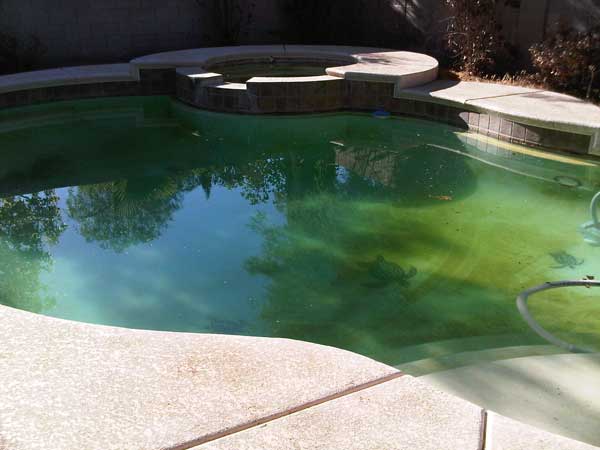Advanced Pool contractors, serving Memphis, TN help with understanding swimming pool algae. The last thing you want to see when you head out to your swimming pool is green or black water. No one wants an algae-filled swimming pool, especially when summer is in full swing. Even if you work with a swimming pool contractor from Advanced Pools, Inc. algae can bloom in your pool.
Algae is incidious and higher temperatures coupled with inconsistent sanitizer levels in the pool water allow algae to grow — sight unseen. Algae grows beneath the surface of the water and your pool could be clear on one day and algae filled on another. Yuck!
Understanding swimming pool algae
Algae is a single cell plant that generates its own food source through the power of the sun. Algae can grow and adapt to almost any pool, in almost any water condition. Algae is invisible to the naked eye and even if you’re diligent in pool cleaning, a spore can hide beneath a pool stair run, for example, and grow unnoticed until it blooms and destroys your clean water.
The swimming pool contractors from Advanced Pool Care can get the pool water back to swimming condition and rid the pool of algae, but it is an ongoing task and can take several days and will definitely take a LOT of chlorine and patience.
There are the types of algae pool owners can be faced with:
- Black algae, which is actually a dark blue or blue green in color. This algae, like all the others, may begin growing in crack it finds in the pool. It is the plague of concrete pools because of the uneven surface of a concrete pool. Black algae is found, in many concrete pools, in the deep end of the pool. The water there is not in sunlight and the black algae when it’s growing in the deep end may be virtually unnoticeable in its early stages. Algaecide, shocking and sanitizing will need to be part of the removal process but it is crucial that you brush the areas where the algae is clinging to thoroughly remove it.
- Green algae is the the most common type of algae in swimming pools. Green algae spores can be found floating on the surface of the water or clinging to the pool at the water line. As with all algae, the pool will need to be thoroughly brushed, vacuumed, shocked and have algaecide added.
- Mustard algae resists the effects of chlorine as it clings to the pool walls and in-pool structures like steps or sun shelves. Mustard algae looks like a spot of dirt more than a patch of algae and could be easily passed over or ignored — to the detriment of the pool water’s health.
YIf you notice anything out of the ordinary in your pool water, give us a call. It’s best to rid the pool of algae before it blooms.


